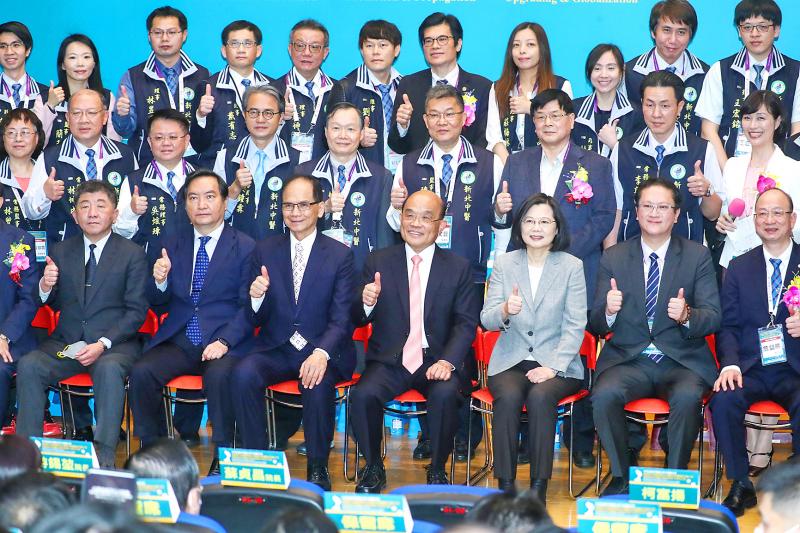The government would protect Taiwan’s traditional Chinese medicine industry and promote its expansion into international markets, President Tsai Ing-wen (蔡英文) said yesterday.
Its successful use in combating COVID-19 deaths has demonstrated the potential that traditional Chinese medicine developed in Taiwan has in international markets, and the government would ensure the quality of the medicine produced, she said.
Tsai was speaking an event in Taipei marking the 92nd anniversary of the founding of the National Research Institute of Chinese Medicine.

Photo: CNA
The institute was responsible for the development of a traditional Chinese medicine formula called Taiwan Chingguan Yihau (清冠一號), or NRICM101, which it was granted permission to export in 2020.
Tsai thanked Chinese Medical Doctors’ Association secretary-general Ko Fu-yang (柯富揚) for his work on Chingguan Yihau.
Ko has developed a treatment program that integrates traditional Chinese medicine and conventional medicine, demonstrating how the two can be used concurrently to treat serious illnesses, she said.
The government is working on building a long-term treatment program for elderly people that incorporates traditional Chinese medicine, she said.
“Taiwan is an aging society, and elderly Taiwanese trust traditional Chinese medicine,” she said.
The government last year commissioned the development of targeted traditional Chinese medicine treatment plans for common health problems such as diabetes, breast cancer and high blood pressure, she said.
“We are also doing more to ensure the quality of traditional Chinese medicine products by inspecting materials at customs, and conducting random market inspections,” she said.
At the same time, the government is offering assistance to traditional Chinese medicine manufacturers who are interested in expanding to international markets, she said.
For example, the government is cooperating with countries targeted by the New Southbound Policy to have traditional Chinese medicine produced in Taiwan made available to physicians in those countries, Tsai said.

Global bodies should stop excluding Taiwan for political reasons, President William Lai (賴清德) told Pope Francis in a letter, adding that he agrees war has no winners. The Vatican is one of only 12 countries to retain formal diplomatic ties with Taiwan, and Taipei has watched with concern efforts by Beijing and the Holy See to improve ties. In October, the Vatican and China extended an accord on the appointment of Catholic bishops in China for four years, pointing to a new level of trust between the two parties. Lai, writing to the pope in response to the pontiff’s message on Jan. 1’s

A Vietnamese migrant worker on Thursday won the NT$12 million (US$383,590) jackpot on a scratch-off lottery ticket she bought from a lottery shop in Changhua County’s Puyan Township (埔鹽), Taiwan Lottery Co said yesterday. The lottery winner, who is in her 30s and married, said she would continue to work in Taiwan and send her winnings to her family in Vietnam to improve their life. More Taiwanese and migrant workers have flocked to the lottery shop on Sec 2 of Jhangshuei Road (彰水路) to share in the luck. The shop owner, surnamed Chen (陳), said that his shop has been open for just

TAKE BREAKS: A woman developed cystitis by refusing to get up to use the bathroom while playing mahjong for fear of disturbing her winning streak, a doctor said People should stand up and move around often while traveling or playing mahjong during the Lunar New Year holiday, as prolonged sitting can lead to cystitis or hemorrhoids, doctors said. Yuan’s General Hospital urologist Lee Tsung-hsi (李宗熹) said that he treated a 63-year-old woman surnamed Chao (趙) who had been sitting motionless and holding off going to the bathroom, increasing her risk of bladder infection. Chao would drink beverages and not urinate for several hours while playing mahjong with friends and family, especially when she was on a winning streak, afraid that using the bathroom would ruin her luck, he said. She had

MUST REMAIN FREE: A Chinese takeover of Taiwan would lead to a global conflict, and if the nation blows up, the world’s factories would fall in a week, a minister said Taiwan is like Prague in 1938 facing Adolf Hitler; only if Taiwan remains free and democratic would the world be safe, Deputy Minister of Foreign Affairs Francois Wu (吳志中) said in an interview with Italian newspaper Corriere della Sera. The ministry on Saturday said Corriere della Sera is one of Italy’s oldest and most read newspapers, frequently covers European economic and political issues, and that Wu agreed to an interview with the paper’s senior political analyst Massimo Franco in Taipei on Jan. 3. The interview was published on Jan. 26 with the title “Taiwan like Prague in 1938 with Hitler,” the ministry